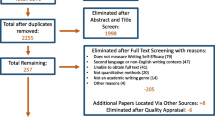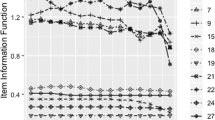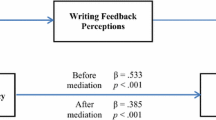Abstract
This review examines and summarizes 16 research studies examining the writing self-efficacy beliefs of 6th- to 10th-grade students. In the majority of the studies, self-efficacy was found to play a primary role in predicting student writing performance. Students with learning disabilities were found to over-estimate their ability to complete specific writing tasks. Several studies found gender differences, with boys rating their confidence higher than girls, although actual performance did not differ. Grade-level differences in perceived efficacy for writing were found in some studies, but not in others. Most studies emphasized that those working with young adolescents need to be aware of the importance of self-efficacy and other motivational beliefs in conjunction with academic functioning. Difficulties with specificity of self-efficacy measures, and with correspondence between measure and criterial task were found in several studies. The article concludes with suggestions for future self-efficacy research.
Similar content being viewed by others
REFERENCES
Anderman, E. M. (1992). Motivation and cognitive strategy use in reading and writing. Paper presented at the annual meeting of the National Reading Conference, San Antonio, TX.
Anderman, E. M., and Maehr, M. L. (1994). Motivation and schooling in the middle grades. Rev. Educ. Res. 64(2): 287–309.
Bandura, A. (1977). Self-efficacy: Toward a unifying theory of behavioral change. Psychol. Rev. 84: 191–215.
Bandura, A. (1986). Social Foundations of Thought and Action: A Social Cognitive Theory, Prentice-Hall, Englewood Cliffs, NJ.
Bandura, A. (1993). Perceived self-efficacy in cognitive development and functioning. Educ. Psychol. 28(2): 117–148.
Bandura, A. (1995). Exercise of personal and collective efficacy in changing societies. In Bandura, A. (ed.), Self-Efficacy in Changing Societies, Cambridge University Press, Cambridge, U.K., pp. 1–45.
Bandura, A. (1997). Self-Efficacy: The Exercise of Control, Freeman, New York.
Bandura, A., Barbaranelli, C., Caprara, G. V., and Pastorelli, C. (1996). Multifaceted impact of self-efficacy beliefs on academic functioning. Child Dev. 67: 1206–1222.
Bereiter, C., and Scardamalia, M. (1987). The Psychology of Written Composition, Erlbaum, Hillsdale, NJ.
Bruning, R., and Horn, C. (2000). Developing motivation to write. Educ. Psychol. 35(1): 25–37.
Bruning, R., Shell, D. F., and Murphy, C. C. (1987). Development of self-efficacy and outcome expectancy for reading and writing: A regression and causal modeling approach. Paper presented at the annual meeting of the National Reading Conference, St. Petersburg, FL.
Campillo, M., and Pool, S. (1999). Improving writing proficiency through self-efficacy training. Poster presented at the annual meeting of the American Educational Research Association, Montreal, Canada.
Eccles, J. S., Midgley, C., and Adler, T. (1984). Grade-related changes in the school environment: Effects on achievement motivation. In Ames, R., and Ames, C. (eds.), The Development of Achievement Motivation, JAI Press, Greenwich, CT, pp. 283–331.
Evans, K. S. (1991). The effects of a metacognitive computer writing tool on classroom learning environment, student perceptions, and writing ability. Paper presented at the annual meeting of the National Reading Conference, Palm Springs, CA.
Graham, S., and Harris, K. R. (1989a). Components analysis of cognitive strategy instruction: Effects on learning disabled students' compositions and self-efficacy. J. Educ. Psychol. 81(3): 353–361.
Graham, S., and Harris, K.R. (1989b). Improving learning disabled students' skills at composing essays: Self-instructional strategy training. Except. Child. 56(3): 201–214.
Graham, S., and Harris, K. R. (2000). The role of self-regulation and transcription skills in writing and writing development. Educ. Psychol. 35(1): 3–12.
Graham, S., Harris, K. R., MacArthur, C. A., and Schwartz, S. (1991). Writing and writing instruction for students with learning disabilities: Review of a research program. Learn. Disab. Q. 14: 89–114.
Graham, S., Schwartz, S., and MacArthur, C. (1993). Learning disabled and normally achieving students' knowledge of writing and the composing process, attitude toward writing, and self-efficacy for students with and without learning disabilities. J. Learn. Disab. 26(4): 237–249.
Hooper, S. R., Swartz, C.W., Montgomery, J.W., Reed, M. S., Brown, T. T., Wasileski, T. J., and Levine, M. D. (1993). Prevalence of writing problems across three middle school samples. School Psychol. Rev. 22(4): 610–622.
Klassen, R. (2001). After the statement: Reading progress made by secondary students with SpLD provision. Educ. Psychol. Pract.
Licht, B. G. (1992). The achievement-related perceptions of children with learning problems; A developmental analysis. In Schunk, D. H., and Meece, J. L. (eds.), Student Perceptions in the Classroom, Erlbaum, Hillsdale, NJ, pp. 247–264.
Licht, B.G., and Kistner, J.A. (1986). Motivational problems of learning-disabled children: Individual differences and their implications for treatment. In Torgesen, J. K., and Wong, B.Y.L. (eds.), Psychological and Educational Perspectives on Learning Disabilities, Academic Press, Orlando, pp. 225–255.
McCarthy, P., Meier, S., and Rinderer, R. (1985). Self-efficacy and writing: A different view of self-evaluation. Coll. Comp. Commun. 36: 465–471.
Meier, S., McCarthy, P. R., and Schmeck, R. R. (1984). Validity of self-efficacy as a predictor of writing performance. Cogn. Ther. Res. 8: 107–120.
Multon, K.D., Brown, S.D., and Lent, R.W. (1991). Relation of self-efficacy beliefs to academic outcomes: A meta-analytic investigation. J. Counsel. Psychol. 38: 30–38.
Nicholls, J. G. (1978). The development of the concepts of effort and ability, perception of academic attainment, and the understanding that difficult tasks require more ability. Child Dev. 49: 800–814.
Nicholls, J. G. (1984). Advances in Motivation and Achievement: The Development of Achievement Motivation, Vol. 3, JAI Press, Greenwich, CT.
Noddings, N. (1996). Current directions in self-research: Self-concept, self-efficacy, and possible selves. Symposium presented at the meeting of the American Educational Research Association, New York, April 1996.
Page-Voth, V., and Graham, S. (1999). Effects of goal-setting and strategy use on the writing performance and self-efficacy of students with writing and learning problems. J. Educ. Psychol. 91: 230–240.
Pajares, F. (1996a). Self-efficacy beliefs in academic settings. Rev. Educ. Res. 66(4): 543–578.
Pajares, F. (1996b). Assessing self-efficacy beliefs and academic outcomes: The case for specificity and correspondence. Paper presented at a symposium at the annual meeting of the American Educational Research Association, New York.
Pajares, F. (1997). Current directions in self-efficacy research. In Maehr, M., and Pintrich, P. R. (eds.), Advances in Motivation and Achievement, Vol. 10, JAI Press, Greenwich, CT, pp. 1–49.
Pajares, F., and Johnson, M. J. (1994). Confidence and competence in writing: The role of selfefficacy, outcome expectancy, and apprehension. Res. Teach. English 28(3): 313–331.
Pajares, F., and Johnson, M. J. (1996). Self-efficacy beliefs and the writing performance of entering high school students. Psychol. Schools 33: 163–175.
Pajares, F., Miller, M. D., and Johnson, M. J. (1999). Gender differences in writing self-beliefs of elementary school students. J. Educ. Psychol.
Pajares, F., and Valiante, G. (1999). Grade level and gender differences in the writing self-beliefs of middle school students. Contemp. Educ. Psychol. 24: 390–405.
Pintrich, P. R., and DeGroot, E.V. (1990). Motivational and self-regulated learning components of classroom academic performance. J. Educ. Psychol. 82: 33–40.
Pintrich, P. R., Roeser, R.W., and De Groot, E. A. M. (1994). Classroom and individual differences in early adolescents' motivation and self-regulated learning. J. Early Adolesc. 14(2): 139–161.
Rankin, J. L., Bruning, R. H., and Timme, V. L. (1994). The development of beliefs about spelling and their relationship to spelling performance. Appl. Cogn. Psychol. 8: 213–232.
Sawyer, R., Graham, S., and Harris, K. R. (1992). Direct teaching, strategy instruction, and strategy instruction with explicit self-regulation: Effects on learning disabled students' compositions and self-efficacy. J. Educ. Psychol. 84: 340–352.
Schunk, D. (1991). Self-efficacy and academic motivation. Educ. Psychol. 26: 207–232.
Schunk, D. H., and Swartz, C.W. (1993). Goals and progress feedback: Effects on self-efficacy and writing achievement. Contemp. Educ. Psychol. 18: 337–354.
Shell, D., Colvin, C., and Bruning, R. (1995). Self-efficacy, attributions, and outcome expectancy mechanisms in reading and writing achievement: Grade-level and achievement-level differences. J. Educ. Psychol. 87: 386–398.
Shell, D. F., Murphy, C. C., and Bruning, R. H. (1989). Self-efficacy and outcome expectancy mechanisms in reading and writing achievement. J. Educ. Psychol. 81: 91–100.
Siegel, L. S. (1992). An evaluation of the discrepancy definition of dyslexia. J. Learn. Disab. 25: 618–629.
Spaulding, C.L. (1995). Teachers' psychological presence on students' writing-task engagement. J. Educ. Res. 88(4): 210–219.
Stanovich, K. (1991). Conceptual and empirical problems with discrepancy definitions of reading disability. Learn. Disab. Q. 14: 269–280.
Stipek, D. J. (1981). Children's perceptions of their own and their classmates' ability. J. Educ. Psychol. 73: 404–410.
Stipek, D. J. (1998). Motivation to Learn: From Theory to Practice, Allyn and Bacon, Needham Heights, MA.
Wigfield, A., and Eccles, J. S. (1994). Children's competence beliefs, achievement values, and general self-esteem: Change across elementary and middle school. J. Early Adolesc. 14(2): 107–138.
Wigfield, A., Eccles, J., MacIver, D., Reuman, D., and Midgley, C. (1991). Transitions at early adolescence: Changes in children's domain-specific self-perceptions and general selfesteem across the transition to junior high school. Dev. Psychol. 27: 552–565.
Wong, B. Y. L., Butler, D. L., Ficzere, S. A., and Kuperis, S. (1996). Teaching low achievers and students with learning disabilities to plan, write, and revise opinion essays. J. Learn. Disab. 29(2): 197–212.
Wong, B. Y. L., Butler, D. L., Ficzere, S. A., and Kuperis, S. (1997). Teaching adolescents with learning disabilities and low achievers to plan, write, and revise compare-and-contrast essays. Learn. Disab. Res. Pract. 12(1): 2–15.
Zimmerman, B. J. (1995). Self-efficacy and educational development. In Bandura, A. (ed.), Self-Efficacy in Changing Societies, Cambridge University Press, Cambridge, U.K., pp. 202–231.
Zimmerman, B. J., and Bandura, A. (1994). Impact of self-regulatory influences on writing course attainment. Am. Educ. Res. J. 31(4): 845–862.
Zimmerman, B. J., Bandura, A., and Martinez-Pons, M. (1992). Self-motivation for academic attainment: The role of self-efficacy beliefs and personal goal-setting. Am. Educ. Res. J. 29(3): 663–676.
Zimmerman, B. J., and Kitsantas, A. (1999). Acquiring writing revision skill: Shifting from process to outcome self-regulatory goals. J. Educ. Psychol. 91(2): 241–250.
Author information
Authors and Affiliations
Rights and permissions
About this article
Cite this article
Klassen, R. Writing in Early Adolescence: A Review of the Role of Self-Efficacy Beliefs. Educational Psychology Review 14, 173–203 (2002). https://doi.org/10.1023/A:1014626805572
Issue Date:
DOI: https://doi.org/10.1023/A:1014626805572




